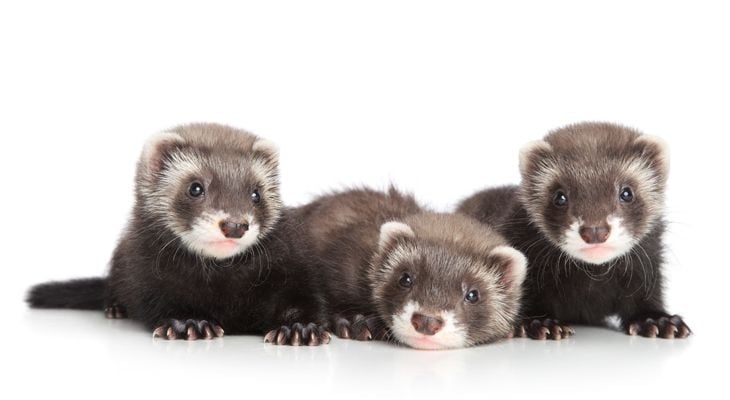You will need to take your ferret in to your veterinarian twice a year for a medical checkup and yearly vaccinations. Ferrets require yearly inoculations against canine distemper. They are highly susceptible to canine distemper and it is always fatal. Do not forget to inoculate against this every year!
Read more

The AVMA recognizes that ferrets are being kept as pets and for research purposes. In those states or areas where ferret ownership is legal, the AVMA recommends responsible ferret ownership. This includes knowledge pertaining to ferret husbandry (care, nutrition, housing, and the species' habits). It is also recommended that no ferret be left unattended with any individual incapable of removing himself or herself from the ferret. It is also important that your ferret have proper care by a veterinarian legally authorized to practice veterinary medicine. This includes preventive medicine and medical or surgical care.
If You Choose A Pet Ferret
The average life span of a ferret is 8 to 10 years. When fully grown, females weigh about one and a half to two pounds while males are generally about twice the weight of females. A female's length is about twelve inches nose to tail and the males are about sixteen inches. Ferrets come in many color variations. Most are shades of brown, grey and black with the mask, feet and tails generally being the darkest in color. "Albino" ferrets are white with pink eyes.
Please read on to understand more if a ferret is the right pet for you.
-
Ferret Health
Category: Choosing Your Pet, Small Mammals, Ferrets, Choosing Your Pet, Small Mammals
-
Behavior and Training
Category: Choosing Your Pet, Small Mammals, Ferrets
Ferrets have powerful, distinct and engaging personalities, and a playful and fastidious nature. Ferrets are diurnal creatures with their periods of greatest activity just before sunrise and shortly after sunset. They sleep about eighteen to twenty hours of the day, waking up twice a day for very active
Read more -
Food and Housing
Category: Choosing Your Pet, Small Mammals, Ferrets
Food Ferrets are exceptionally playful, so expect your ferret to tip over his food and water bowls. Check on them often, tape them down, or use an unspillable bowl. Rodent water bottles are not recommended as a ferret may damage his teeth on the spout. Because ferrets have such rapid metabolism, they
Read more
Location
Find us on the map
Office Hours
Our Regular Schedule
Monday:
7:30 am-5:00 pm
Tuesday:
7:30 am-5:00 pm
Wednesday:
Closed
Thursday:
7:30 am-5:00 pm
Friday:
7:30 am-5:00 pm
Saturday:
7:30 am-12:00 pm
Sunday:
Closed
